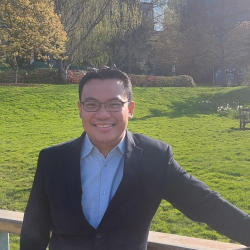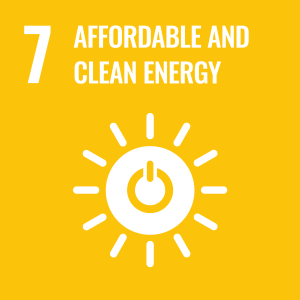
Dr Aditya Putranto
Academic and research departments
School of Chemistry and Chemical Engineering, Faculty of Engineering and Physical Sciences.About
Biography
Dr Aditya Putranto is a Senior Lecturer at the University of Surrey, with expertise in evidence-based approach for sustainable development. He has been focusing on sustainability assessment (technical, economic, social, environment) and sustainability intervention approach implemented to energy, environment, and food systems.
Combining with his expertise in digital tools, he has integrated sustainable systems with digital technology to create digital sustainable systems aiming at attaining low carbon economy. The platform has been implemented at industrial settings to revamp the processes to improve the sustainability status.
In terms of teaching/education, he is Senior Fellow of Higher Education Academy (SFHEA) UK. He has successfully led curriculum and program development, including (1) embedding sustainability into curriculum (2) developing design-based learning (3) developing digital-based approach based on modeling and simulation tools. He has innovated his teaching through co-creation with students, industry, and society. He has been acknowledged for his effective teaching methods and high-level engagement with students. He has been awarded with "Commendation of Teaching Excellence" by Deputy VC Education Monash University and Outstanding Teaching Evaluation Questionnaire at University of Surrey and Queens University Belfast.
Areas of specialism
My qualifications
Affiliations and memberships
PR275895
ResearchResearch interests
My research is focused on achieving net zero in food, energy and environment systems. More importantly, I have linked the sustainability with digital technology, through digital sustainable systems, by establishing modeling and simulation tools, which are used for optimization and decision-making in industry.
1. Sustainable Energy Systems:
aiming at lowering energy demands and adverse environmental impacts, innovative
processes and plant intensification schemes are developed and investigated. Based on
biomass, integrated facility to simultaneously produce green energy, food additives and
useful materials is proposed. Here, plant-wide simulation is used for designing the
processes, analysing resources and energy flows as well as evaluating the economic
feasibility and environmental impacts.
2. Sustainable Environment Systems:
this project focuses on ‘waste to wealth’ process based on circular economy principles to
upscale waste. Simulation tools are used to develop the processes and evaluate the feasibility.
3. Sustainable Food Systems:
aiming at producing high quality food materials and achieving net zero in food systems, solar
energy and enhanced methods (i.e. by using microwave, infrared, ultrasound) are proposed
and investigated in food processing. Similarly, active packaging combined with
understanding of food material science has been used to lower the refrigeration load during
food distribution.
Research interests
My research is focused on achieving net zero in food, energy and environment systems. More importantly, I have linked the sustainability with digital technology, through digital sustainable systems, by establishing modeling and simulation tools, which are used for optimization and decision-making in industry.
1. Sustainable Energy Systems:
aiming at lowering energy demands and adverse environmental impacts, innovative
processes and plant intensification schemes are developed and investigated. Based on
biomass, integrated facility to simultaneously produce green energy, food additives and
useful materials is proposed. Here, plant-wide simulation is used for designing the
processes, analysing resources and energy flows as well as evaluating the economic
feasibility and environmental impacts.
2. Sustainable Environment Systems:
this project focuses on ‘waste to wealth’ process based on circular economy principles to
upscale waste. Simulation tools are used to develop the processes and evaluate the feasibility.
3. Sustainable Food Systems:
aiming at producing high quality food materials and achieving net zero in food systems, solar
energy and enhanced methods (i.e. by using microwave, infrared, ultrasound) are proposed
and investigated in food processing. Similarly, active packaging combined with
understanding of food material science has been used to lower the refrigeration load during
food distribution.
Teaching
Design Project (Module Leader)
Separation Process 2 (Module Leader)
Sustainable Processing
Sustainable System
Circular Economy Solution
Sustainability Assessment
Sustainable development goals
My research interests are related to the following:



Publications
Highlights
Full publications are accessible in Google Scholar https://scholar.google.co.uk/citations?user=zocjfgEAAAAJ&hl=en
Selected publications:
Ng, Z.W., Yeoh, K.Y., Hafyan, R.H., Putranto, A., Horri, B.A., Zein, S.H., Rhamdhani, M.A., Aziz, M., Butar, I., 2024. Technoeconomic analysis of production of octane booster components derived from lignin. Biomass Conversion and Biorefinery, https://doi.org/10.1007/s13399-023-05255-w
Santoso, E.E., Saptoro, A., Kumar, P., Tiong, A.N.T., Putranto, A., Suherman, S., 2023. 7E+Q analysis: a new multidimensional assessment tools for solar drying of food and agricultural products. Environment, Development and Sustainability. https://doi.org/10.1007/s10668-023-03341-7
Mohammed, M.Z.R., Ng, Z.W., Putranto, A., Kong, Z.Y., Sunarso, J. Aziz, A., Hein, S.H., Giwangkara, J., Butar, I. 2023. Process design, simulation and techno-economic analysis of integrated production of furfural and glucose derived from palm oil empty bunch. Clean Technology and Environment Protection (2023). https://doi.org/10.1007/s10098-022-02454-3
Ng, Z.W., Gan, H.X., Putranto, A., Rhamdhani, M.A., Zein, S.H., George, O.A. Giwangara, J., Butar, I., 2022. Process design and life cycle assessment of furfural and glucose co-production derived from palm oil empty fruit bunches. Environment, Development and Sustainability https://doi.org/10.1007/s10668-022-02633-8
Zein, S.H., Grogan, C.T., Yansaneh, O.Y., Putranto, A., 2022. Pyrolysis of high density polyethylene waste plastic to liquid fuels – Modeling and economic analysis. Processes 10 (8), 1503.
Putranto, A., Hadibarata, T., Aziz, M., Yeo, J.Y.Y., Ismadji, S., Sunarso, J. 2022., Effects of pyrolysis temperature and impregnation ratio on adsorption kinetics and isotherm of methylene blue on corn cobs activated carbons. South African Journal in Chemical Engineering 42, 91-97.
Aziz, M., Putranto, A., Biddinika, M.K., Wijayanto, A.T., 2017. Energy saving combination of N2 production, NH3 synthesis and power generation. International Journal of Hydrogen Energy 42, 27174-27183
In this study, a comprehensive process for production of an environmentally friendly octane booster (acetophenone) from lignin is presented, along with a detailed techno-economic analysis. Recognizing that much of the prior research on octane boosters has been confined to experimental lab-level investigations, this study develops comprehensive process design to unravel the intricacies of large-scale acetophenone production. The acetophenone production process involves catalytic hydrogenolysis, which also yields phenol as a valuable side product. Based on the process flow diagram, mass and energy balances were developed, revealing significantly improved yields and purity of acetophenone compared to industry standards, reaching 0.74 kg acetophenone per kg of lignin and 99 wt%. In the techno-economic analysis, calculations involving fixed capital investment (FCI), operating costs, and working capital were conducted based on a feed of 100 kg/h of dry lignin. The results indicate FCI at 2.72 million USD, operating costs at 1.09 million USD per year, and working capital at 0.57 million USD. Assuming a 20-year operational lifespan, the payback period is estimated at 6.09 years, as depicted by the cumulative cash flow diagram. Moreover, techno-economic analysis demonstrates a net present value (NPV) of 3.24 million USD at a 10% discount rate, an internal rate of return (IRR) of 22.73%, and a return on investment (ROI) of 34.39%. These positive outcomes underscore the robust profitability of the proposed acetophenone production plant derived from lignin. Additionally, a sensitivity analysis on the IRR indicates that increasing the production capacity could further enhance profitability, reaffirming the feasibility of the plant's operation. Crucially, this study highlights the potential for sustainable and economically viable production of acetophenone, offering an environmentally friendly alternative to toxic octane boosters and advancing the development of sustainable fuel additives.